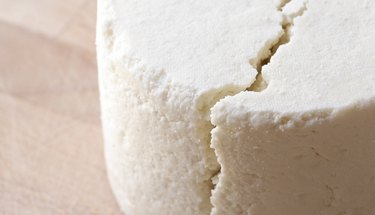
Cheese made with whole milk is a high-fat food, but it also provides protein, calcium and a variety of other nutrients, which makes it part of a nutritious diet when consumed in moderation. Cheese comes in many varieties, including an ethic type called feta cheese that is digested in the same way as other dairy products.
Definition
Video of the Day
Feta cheese is a type of cheese made from either cow or goat milk. Feta cheese is dry and crumbles easily, making it popular as a topping for salads and other dishes. This cheese is also used for cooking or stuffing other food items and is especially common in Greek recipes.
Video of the Day
Digestive Process
Your digestive system is a lengthy system that starts at your mouth and runs down to your anus. You take in food through your mouth, where the process begins, and you chew it and mix it with saliva. Swallowed food goes through the esophagus and into the stomach, then journeys through the small and large intestines. The last part of the large intestine, known as the colon, completes nutrient removal and moves food into the rectum where it waits to be passed out as waste through the anus. Different foods move through the system at different speeds.
Cheese and Digestion
The normal digestive process takes anywhere for 24 to 72 hours, and cheese is a slow-to-digest food. Food remains in your stomach and small intestine anywhere from six to eight hours, then moves to your colon for further processing, according to Michael Picco of the Mayo Clinic. Food starts getting passed out of the body within 24 hours, although items that are digested slowly can take several days to leave your system. This time frame is normal, so feta cheese does not cause any digestive problems.
Lactose Intolerance
Feta cheese is a dairy product, so it causes digestive problems in lactose-intolerant people. Lactose intolerance is a medical condition in which your small intestine does not make enough of a digestive enzyme called lactase, PubMed Health advises. Your body needs this enzyme for proper digestion of feta cheese and other dairy products. Eating feta cheese and other milk-based products when you are lactose intolerant causes uncomfortable symptoms like bloating, flatulence, stomach cramps, nausea and diarrhea. These symptoms eventually resolve on their own once the feta cheese or other dairy product passes out of your system.
Considerations
Moldy feta cheese is okay to eat if it is solid and you cut off the mold, according to Katherine Zeratsky of the Mayo Clinic, because the growth cannot penetrate semisoft and hard cheese varieties. Throw away crumbled feta cheese if it's moldy because the mold can penetrate crumbled cheeses and hurt your digestive system with bacteria like brucella, listeria, salmonella or E. coli.
- Food.com: Kitchen Dictionary, Feta Cheese
- National Digestive Diseases Information Clearinghouse; Your Digestive System and How it Works; April 2008
- Mayo Clinic; Digestion, How Long Does it Take?; Michael Picco; August 2010
- PubMed Health; Lactose Intolerance; July 2010
- Berkeley Wellness Alerts; Is Cheese Healthy?; March 2011
- Cheese.com: Feta